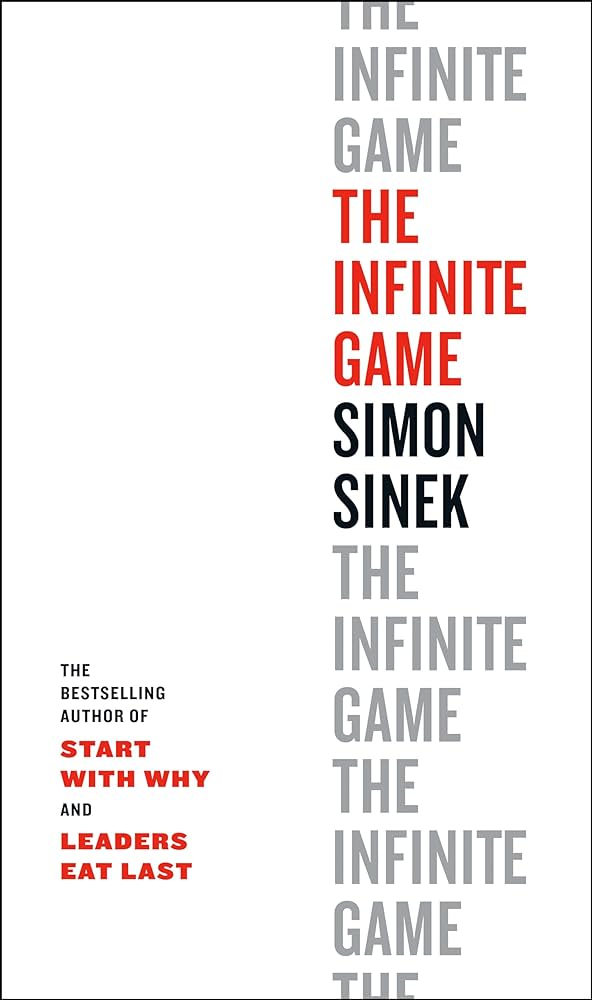The Infinite Game argues that leaders of companies should manage to an existence in perpetuity rather than chasing short-term wins. Companies adopting this mindset attract talent with a just cause – an inspiring vision of the future they are constantly striving towards. When anchored to a just cause rather than a product or service, companies are willing to transform themselves fully when needed to continue supporting that cause.
Simon explains that money fuels the advancement of a cause, but a company’s primary purpose is to serve customers. Interestingly, companies excelling at customer service often make the most money and are most enduring (e.g., Amazon and Apple).
Competing with an infinite game mindset means viewing key competitors as worthy rivals. This shifts focus from obsessing about beating them to learning how they thrive, helping improve your own business. In men’s tennis, consider how much Federer, Nadal and Djokovic credit each other for elevating their own games.
This book has motivated me to focus on the underlying purpose of my work and how to leverage the talents of others to improve upon it.
You should read this book if you…
- want to better connect your work with its underlying purpose
- seek a more sustainable mindset to improvement
- are trying to inspire a team to achieve challenging goals
Additional Information
Year Published: 2018
Book Ranking (from 1-10): 8 – Very Good – In depth insights on a specific topic
Ease of Read (from 1-5): 3 – Average
Key Highlights
- Infinite games have infinite time horizons. And because there is no finish line, no practical end to the game, there is no such thing as “winning” an infinite game. In an infinite game, the primary objective is to keep playing, to perpetuate the game
- To succeed in the Infinite Game of business, we have to stop thinking about who wins or who’s the best and start thinking about how to build organizations that are strong enough and healthy enough to stay in the game for many generations to come
- Where a finite-minded player makes products they think they can sell to people, the infinite-minded player makes products that people want to buy. The former is primarily focused on how the sale of those products benefits the company; the latter is primarily focused on how the products benefit those who buy them
- But a company built for stability still fails to understand the nature of the Infinite Game, for it is likely still not prepared for the unpredictable—for the new technology, new competitor, market shift or world events that can, in an instant, derail their strategy. An infinite-minded leader does not simply want to build a company that can weather change but one that can be transformed by it. They want to build a company that embraces surprises and adapts with them. Resilient companies may come out the other end of upheaval entirely different than they were when they went in (and are often grateful for the transformation)
- The choice to lead with an infinite mindset is less like preparing for a football game and more like the decision to get into shape. There is no one thing we can do in order to get into shape. We can’t simply go to the gym for nine hours and expect to be in shape. However, if we go to the gym every single day for twenty minutes, we will absolutely get into shape. Consistency becomes more important than intensity
- A Just Cause is a specific vision of a future state that does not yet exist; a future state so appealing that people are willing to make sacrifices in order to help advance toward that vision
- A Just Cause is not the same as our WHY. A WHY comes from the past. It is an origin story. It is a statement of who we are—the sum total of our values and beliefs. A Just Cause is about the future. It defines where we are going. It describes the world we hope to live in and will commit to help build. Everyone has their own WHY (and everyone can know what their WHY is if they choose to uncover it). But we do not have to have our own Just Cause, we can choose to join someone else’s. Indeed we can start a movement, or we can choose to join one and make it our own
- The operative word in all this is “primary.” Service orientation does not mean charity. In charity, the vast majority, if not all, the benefit of our contributions must go to the receiver. And any benefit the contributor gets is the good feeling that they contributed. In business, of course we can consider how our work will benefit us or advance our own lot. Of course we can expect and even demand to be fairly compensated and recognized for our efforts and results. We can want our investors to benefit too, just not at the expense of the company, the people who work there or the customers who buy from us
- Money is the fuel to advance a Cause, it is not a Cause itself. The reason to grow is so that we have more fuel to advance the Cause. Just as we don’t buy a car simply so we can buy more gas, so too must companies offer more value than their ability to make money. A company, like a car, is more valuable to all constituents when it takes us somewhere to which we would otherwise be unable to go. That place we envision going to is the Just Cause
- This is one of the reasons the best organizations are often run in tandem. The combination of the keeper of the vision (CVO) and the operator (the CFO or COO). It is a partnership of complementary skill sets
- “Disruption” is likely not the cause of the challenge, it’s a symptom of a more insidious root cause. It is not technology that explains failure; it is less about technology, per se, and more about the leaders’ failure to envision the future of their business as the world changes around them. It is the result of shortsightedness. And shortsightedness is an inherent condition of leaders who play with a finite mindset
- Except there is a flaw in the business model of private equity that can wreak havoc with any company keen to stay in the game. For private equity and venture capital firms to make money, they have to sell. And it’s often about three to five years after they make their initial investment. A private equity firm or venture capitalist can use all the flowery, infinite game, Cause-focused language they want. And they may believe it. Up until the point they have to sell. And then all of a sudden many will care a lot less about the Just Cause and all the other stakeholders. The pressure investors can exert on the company to do things in the name of finite objectives can be and often is devastating to the long-term prospects of the company
- A nation state must protect its citizens, to ensure that we live free from fear. To do that, it must maintain armed forces to defend against foreign threats, establish justice and insure domestic tranquillity. Likewise, inside an organization, a company must provide for the protection of its people by building a culture in which employees feel psychologically safe and feel like their employer cares about them as human beings. We want to know that the company is invested in our growth as much as it is its own
- When a group shares in the suffering, it actually brings a team together. It is the same reason people come together after a natural disaster. However, when some are forced to bear an unbalanced amount of the burden, it can rip a culture apart
- The funny thing is, it is actually incredibly easy to identify the high performers of low trust on any team. Simply go to the people on the team and ask them who the asshole is. They will likely all point to the same person
- Leaders are not responsible for the results, leaders are responsible for the people who are responsible for the results. And the best way to drive performance in an organization is to create an environment in which information can flow freely, mistakes can be highlighted and help can be offered and received. In short, an environment in which people feel safe among their own. This is the responsibility of a leader
- Ethical fading is a condition in a culture that allows people to act in unethical ways in order to advance their own interests, often at the expense of others, while falsely believing that they have not compromised their own moral principles. Ethical fading often starts with small, seemingly innocuous transgressions that, when left unchecked, continue to grow and compound
- If we are a player in an infinite game, however, we have to stop thinking of other players as competitors to be beaten and start thinking of them as Worthy Rivals who can help us become better players
- The impact of this subtle mind shift can be profound in how we make decisions and prioritize resources. Traditional competition forces us to take on an attitude of winning. A Worthy Rival inspires us to take on an attitude of improvement. The former focuses our attention on the outcome, the latter focuses our attention on process. That simple shift in perspective immediately changes how we see our own businesses. It is the focus on process and constant improvement that helps reveal new skills and boosts resilience. An excessive focus on beating our competition not only gets exhausting over time, it can actually stifle innovation

Discover more from The Broader Application
Subscribe to get the latest posts sent to your email.
